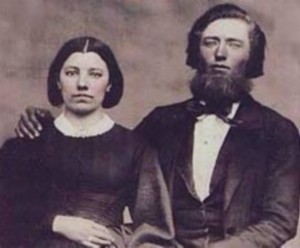“Real Men” — What’s That?
From time to time it’s helpful to ask, and try to answer, the question of just what is a “real man.” I recently saw a book criticizing the commercialization of boyhood. The cover artwork showed a hapless young man about ten or twelve years old. He was wearing a football helmet, shoulder pads, and Superman cape, holding an electric guitar and standing on a skateboard. The authors’ point was that from a marketing standpoint, boys are given the option of being a tough guy or a cool guy, the superhero or the slacker, with little option besides.
There is a reason for stereotypes–sometimes, they are caricatures of something which may have a basis in fact. Boys, and the men they become, do tend to respect strength, independence, athletic skill, things like that. They are also prone to abuses of those things — the strong may be bullies, the independent may be rebellious, the athletes may be over-proud of their skills or simply devoted to their own amusement. There is a balance to find in all of these.
But being a “real man” isn’t about fulfilling stereotypes. It’s not about being able to bench press 450 pounds, earn your first million before you turn thirty, or fathering a child before you turn 18. It’s not about wrestling alligators or growing a thicket of chest hair. Rather, becoming a real man is a matter of meeting the challenge and calling that God has given you. Simply that, and it’s enough to occupy all your time and attention and strength, without aspiring to cartoonish levels of physical conditioning or hypermasculine behavior or sacrificing all for a pot of gold.
We’re reading the Little House series by Laura Ingalls Wilder. Young Laura is the central character, but the center of the family is Pa Ingalls. He loves his wife and children, he works night and day to provide even a meager living for them, but as long as he can stand, he gives his all for the family. What’s more, he doesn’t give in. In On The Banks of Plum Creek, Pa was so delighted with the lush crop of wheat on his Minnesota homestead, he made an uncharacteristic gamble and borrowed against the expected harvest to buy materials to build a house. When locusts appeared and stripped the entire field, it rocked his world. But then it got worse. As he was plowing under the ruined stalks, he suddenly stopped, then put away the team and the plow and came into the house.
Ma looked up at him and said, “Charles! What is the matter now?”
“The grasshoppers are laying their eggs,” said Pa. “The ground’s honeycombed with them. Look at the dooryard, and you’ll see the pits where the eggs are buried a couple of inches deep. All over the wheat-field. Everywhere. You can’t put your finger between them. Look here.”
He took one of those gray things from his pocket and held it out on his hand.
“That’s one of ’em, a pod of grasshopper eggs. I’ve been cutting them open. There’s thirty-five or forty eggs in every pod. There’s a pod in every hole. There’s eight or ten holes to the square foot. All over this whole country.”Ma dropped down in a chair and let her hands fall helpless at her sides.
“We’ve got no more chance of making a crop next year than we have of flying,” said Pa. “When those eggs hatch, there won’t be a green thing left in this part of the world.”
“Oh, Charles!” Ma said. “What will we do?”
Pa slumped down on a bench and said, “I don’t know.” …
Laura’s sister Mary came downstairs,
… without a sound. She stood close beside Laura, backed against the wall.
Pa straightened up. His dim eyes brightened with a fierce light, not like the twinkle Laura had always seen in them.
“But I do know this, Caroline,” he said. “No pesky mess of grasshoppers can beat us! We’ll do something! You’ll see! We’ll get along somehow.”
“Yes, Charles,” said Ma.
“Why not?” said Pa. “We’re healthy, we’ve got a roof over our heads; we’re better off than lots of folks. You get an early dinner, Caroline. I’m going to town. I’ll find something to do. Don’t you worry!”
[Laura Ingalls Wilder, On The Banks of Plum Creek, pp 208-209]
All through the series you see this — Charles Ingalls refuses to be defeated. Even when he has to walk three hundred miles to find work to pay off his debts, even when he loses his Kansas homestead to a surveying error, even when trapped by blizzards (more than once!), Pa always gets control of his very reasonable fears, worries, or alarms, and buckles down to do what he needs to do. He’s not flashy, eloquent, or especially remarkable from a worldly standpoint — but he understands his responsibility to work hard, provide for his family’s needs and safety, and lives with integrity. That’s a real man.
Another, very different example, is my hero Martin Luther. We look back at the great reformer he became, but in 1521 he was just a priest who had been fired by his monastic order, excommunicated by the pope, and called before the Holy Roman Emperor and church authorities to retract his teaching. Luther knew very well that other men had burned at the stake for what he was about to say, but he looked the Emperor in the eye and told him,
Unless I am convinced by the testimony of the Scriptures or by clear reason … I am bound by the Scriptures I have quoted and my conscience is captive to the Word of God. I cannot and will not recant anything, since it is neither safe nor right to go against conscience. Here I stand; I can do nothing else. Amen.
I don’t agree 100% with Luther’s theology, but I have tremendous respect for his courage. Luther was a scholar, not an action hero. He was a law student who was frightened into a monastery by a lightning bolt. Yet here he stood alone, willing to die for what some considered just an academic issue or a matter for debate among churchmen, but he was convinced was eternal and true.
This is what we are trying to teach our sons, and what we try to communicate in our book. Our geeky guys may do a far greater service than our more stereotypical ones – imagine someone frantically coding on his laptop, protecting a Christian site in a closed country from infiltration from their tyrannical government. It takes just as much manly virtue of courage and initiative to do that as it does to lead a safari – and is eternally important, to boot!
If God has called you to be a steelworker or a lumberjack or a commercial fisherman, go with God’s blessing! If He has called you to be a professional pianist or a social worker or a software analyst, strive for excellence in His sight! But whatever you do, always be true to His calling to “do justly, and to love mercy, and to walk humbly with your God” (Micah 6:8)

